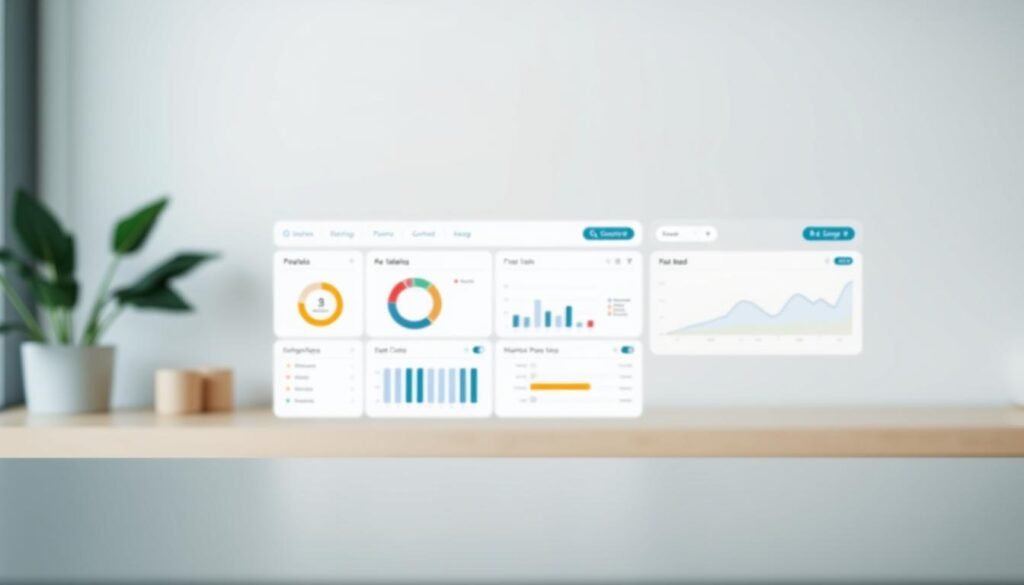What if you could find accurate contact information for any business decision-maker in seconds, not hours? This question drives modern sales teams who need to move fast. The right data can make or break a deal.
In today’s competitive market, manual prospecting wastes valuable time. A powerful sales intelligence platform provides a direct path to your target audience. Lusha turns research into revenue.
This review examines one such tool. We will explore Lusha core capabilities for finding verified business contact details. The goal is to help you decide if this solution fits your team’s needs and budget.
Key Takeaways
- A robust B2B database accelerates the entire sales process.
- Accurate contact data eliminates friction in prospecting.
- Sales intelligence platforms help teams focus on closing deals.
- Lusha provides scalable access to decision-makers.
- Automating research saves time and increases productivity.
Introduction: Lusha’s Journey from Lead Generation to AI Sales Intelligence
In the competitive world of B2B sales, the journey from simple data collection to AI-powered intelligence represents a major industry shift. The platform began in 2016 with a clear mission: build the largest crowdsourced data community for business professionals.
This vision focused on providing accurate, accessible data through self-service products. Sales, marketing, and recruiting teams quickly adopted the solution for its efficiency.
From a Simple Lead Database to an AI Sales Prospecting Tool
Initially, Lusha operated as a straightforward B2B lead database. It helped professionals find verified contact information quickly. The tool eliminated manual prospecting tasks that wasted valuable time.
As AI technology advanced, the platform evolved significantly. It integrated intelligent features that automate lead identification and qualification. This transformation kept the company competitive against newer AI-native platforms.
Market Relevance and Evolution in 2025
Today, Lusha positions itself as a comprehensive AI sales prospecting tool. It offers automated lead recommendations and AI-powered email assistants. Dynamic prospect playlists adapt based on user criteria and workflow patterns.
This evolution addresses growing demand for consolidated sales tools. Businesses want solutions that handle multiple workflow stages efficiently. The platform now competes with full-featured sales engagement systems and AI sales agents.
Lusha Review: Assessing Its Value and Innovation
Customer reviews and ratings offer a transparent window into how a tool performs across different business scenarios. The collective experience of users reveals both strengths and limitations that impact daily workflow efficiency.
User Feedback and Verified Ratings
Professional platforms like G2 show strong satisfaction among business users. The platform earns 4.3 out of 5 stars from nearly 1,500 verified reviews. Capterra ratings align closely with this positive feedback.
Trustpilot presents a contrasting perspective with significantly lower scores. This difference suggests varying expectations between professional and general consumer reviewers. Data accuracy receives mixed feedback depending on industry focus.
Many users praise the clean interface and intuitive search filters. Teams appreciate the minimal training required for immediate productivity. The Chrome extension functionality receives consistent positive mentions.
Comparative Advantages Over Other AI Sales Tools
Lusha offers significant cost savings compared to enterprise alternatives. The pricing structure makes it accessible for growing companies with limited budgets. Businesses find the setup process faster than comprehensive platforms.
The credit-based plan provides flexibility for teams with fluctuating needs. However, some users report rapid credit depletion affecting predictability. The platform excels at contact discovery but lacks multichannel outreach capabilities.
For businesses focused primarily on email prospecting, the tool delivers sufficient functionality. Companies requiring advanced automation may need additional solutions. The balance of simplicity and effectiveness meets many teams’ core requirements.
Core Capabilities: Contact & Company Data Excellence
Effective prospecting begins with reliable contact information that sales teams can trust immediately. The platform’s database contains over 165 million business profiles, providing extensive coverage across multiple industries and company sizes.
Each contact record includes comprehensive data fields like full names, job titles, direct email addresses, and phone numbers. Company details such as industry classification and revenue estimates enable personalized outreach.
Extensive Database and Advanced Filtering Options
Advanced filtering capabilities allow precise segmentation of prospects by numerous criteria. Users can target companies by size, annual revenue range, geographic location, and technology stack.
The Chrome extension extracts contact data directly from LinkedIn profiles in real-time. This eliminates platform switching and significantly reduces list-building time.
Data accuracy remains generally reliable for mainstream industries and larger companies. Sales teams can identify decision-makers within specific account targets for account-based strategies.
Bulk contact discovery accelerates processes that would otherwise require hours of manual research. Users can upload lists or use saved searches to enrich hundreds of records simultaneously.
AI-Driven Features and Prospecting Innovations
Modern sales teams demand tools that automate prospecting and outreach, moving beyond simple data collection. The platform now includes intelligent features designed to accelerate the entire sales cycle.
Engage Feature: AI Email Assistant and Sequencing
Lusha’s Engage feature acts as a built-in AI email assistant. It uses advanced technology to generate complete cold email sequences.
Users provide a goal, like booking a demo. The tool then creates personalized subject lines and message variants. It also suggests optimal send times for your outreach campaigns.
This turns the system into a lightweight sales engagement platform. You can launch campaigns without switching to other tools. A key limitation is that outreach is confined to email only.
Dynamic Prospect Playlists for Automated Lead Recommendations
Dynamic Prospect Playlists offer a smart way to find new leads. The system automatically suggests up to 50 qualified prospects each week.
It learns from your ideal customer profile. You provide examples of good leads, and the AI finds similar prospects. This automates continuous lead generation.
These playlists improve over time based on your engagement. Intent signals and job change alerts add further intelligence. They notify you when prospects are most receptive.
Understanding Lusha’s Credit-Based Pricing Model
Credit consumption models present a unique approach to sales tool pricing that differs from traditional subscription models. Teams pay for actual usage rather than fixed contact limits.
Free Plan versus Paid Options and Credit Consumption
The free plan provides 50 credits each month with one user seat. This allows individuals to test the platform’s data quality before financial commitment.
Understanding credit costs is essential for budget planning. Email reveals cost 1 credit, while phone numbers require 5 credits per contact. This makes phone data significantly more expensive.
Paid plans start with the Pro option at approximately $22-36 per month. This plan includes 3 user seats and annual credit packages from 3,600 to 90,000 credits.
The Premium plan begins around $52-59 monthly with 5 seats. It offers advanced analytics and expanded bulk contact capabilities. Both plans use annual billing for better rates.
Enterprise organizations should contact sales for custom Scale plan pricing. This option provides unlimited seats and advanced team management features.
The credit model offers flexibility but requires careful resource management. Teams must monitor usage to avoid unexpected credit depletion during active prospecting months.
User Experience, Interface, and Seamless Integrations
Seamless user experience often determines whether a prospecting platform becomes an essential tool or just another unused subscription. The interface design directly impacts how quickly sales teams can adopt new technology into their daily workflow.

New users appreciate the straightforward setup process that gets them prospecting within minutes. The clean design minimizes learning curves and technical barriers that often slow down implementation.
Easy Onboarding and Chrome Extension Benefits
The Chrome extension represents one of the most valuable features for daily users. It provides instant access to contact information directly from LinkedIn profiles and company websites.
This eliminates the need to switch between multiple applications, saving valuable research time. The extension works with standard LinkedIn accounts, avoiding costly premium subscription requirements.
When browsing professional profiles, the tool automatically displays available data like email addresses and phone numbers. This seamless integration keeps the workflow uninterrupted and efficient.
CRM integrations with platforms like Salesforce and HubSpot ensure prospect information syncs automatically. This eliminates manual data entry and maintains accurate records across systems.
For teams using other systems, Zapier connectivity offers flexible integration options. The responsive design provides consistent experience across all devices, allowing users to work from anywhere.
Sales Intelligence and Lead Generation Strategies
Modern sales intelligence platforms now prioritize timing as much as targeting precision. The most successful teams combine accurate contact data with behavioral signals that indicate purchase readiness.
This approach transforms traditional prospecting into a strategic process. It ensures outreach efforts focus on prospects most likely to convert.
Utilizing Intent Signals and Custom Filters for Precise Targeting
Intent signals provide critical insights into prospect behavior and company changes. These signals include job changes, technology adoption, and growth indicators.
Sales teams can configure custom alerts based on specific keywords or business events. The platform monitors these triggers continuously across its network.
Each prospect receives an intent score quantifying their purchase likelihood. This scoring system helps teams prioritize outreach toward high-potential contacts.
For example, companies adding specific technologies to their stack trigger automatic notifications. This creates timely opportunities for relevant solution introductions.
Streamlining Contact Management via CRM Integrations
CRM integrations ensure seamless data flow between prospecting and sales execution. Contact information, intent scores, and behavioral signals sync automatically.
This eliminates manual data entry and reduces context switching between platforms. Teams access complete intelligence within their primary working environment.
The integration maintains visibility across all team members from SDRs to account executives. It ensures everyone knows which prospects warrant immediate attention.
Strategic lead generation combines database filtering with intent monitoring. This creates continuously refreshed prospect lists reflecting both ideal profile fit and temporal buying signals.
Comparing Lusha with Competing Prospecting Platforms
The sales technology landscape offers diverse options ranging from focused data providers to all-in-one engagement platforms. Understanding these distinctions helps businesses select tools that match their specific workflow requirements and budget constraints.
Lusha vs. Multi-Channel Tools like Reply.io
When comparing this platform to comprehensive solutions like Reply.io, key differences emerge in functionality scope. Reply.io provides a native database with over 1 billion contacts plus multichannel outreach including email, calls, and social messaging.
Its Jason AI acts as an autonomous sales agent handling lead identification and response management. This represents a higher automation level than the email-focused approach of the primary tool discussed.
Alternative Solutions and Their Unique Value Propositions
ZoomInfo serves enterprise teams needing deep company data but at premium pricing. Cognism emphasizes global compliance for international businesses operating across regulated markets.
Apollo.io offers cost-efficient full suites ideal for startups. Leadfeeder focuses on website visitor conversion, while UpLead prioritizes data accuracy with real-time verification.
The right choice depends on specific business needs. Teams requiring simple contact discovery may prefer focused tools. Organizations needing multichannel engagement benefit from comprehensive platforms.
Implementing Lusha in Your Sales Process
Strategic implementation transforms any sales tool from a simple utility into a revenue-generating asset. Proper integration ensures your team maximizes the platform’s capabilities while maintaining workflow efficiency.
Best Practices for Integrating Lusha with Your Workflow
Start by defining your ideal customer profile with precision. Configure advanced filters for specific technologies and revenue ranges. This targeting approach saves valuable research time.
Automate contact data flow through CRM integrations. The Chrome extension and API work together seamlessly. They eliminate manual entry and maintain data consistency across systems.

Maximizing ROI through Automated Outreach and Data Accuracy
Train your team on credit management strategies. Establish guidelines for when to reveal emails versus phone numbers. This prevents premature credit depletion during active prospecting.
Combine Lusha with complementary tools for enhanced results. Website visitor identification platforms capture inbound intent signals. This creates a complete lead generation ecosystem.
Regularly audit data accuracy and outreach performance. Track metrics like cost per qualified lead and time saved. These measurements validate your investment and guide future efforts.
Conclusion
Choosing the right sales intelligence tool requires balancing core data access with advanced automation needs. Lusha delivers exceptional value as a B2B contact database, particularly for small to mid-sized businesses.
Its strengths lie in an intuitive interface, rapid setup, and reliable data accuracy for mainstream companies. AI features like prospect playlists and email sequencing add significant power for targeted outreach.
However, the platform focuses primarily on email, which may limit teams needing multichannel campaigns. The credit-based model offers flexibility but demands careful management.
Lusha excels as a component within a broader tech stack. For teams prioritizing simple, affordable contact discovery, it is a strong choice. Businesses should evaluate their specific sales process complexity before deciding.
FAQ
How does the credit system work for contact data and phone numbers?
The platform operates on a credit-based model. Each credit allows you to reveal one contact’s direct details, such as a verified phone number or professional email address. Your monthly plan includes a set number of credits, which you use to access the information for your lead generation efforts.
What is the accuracy rate for the contact information provided?
The service maintains a high standard of data accuracy for its B2B contact database. The information, including mobile numbers and email addresses, is regularly verified to ensure reliability for your sales team’s outreach and prospecting activities.
Can I integrate this tool with my existing CRM and marketing platforms?
A> Yes, seamless integrations are a core feature. The platform connects directly with popular CRM systems and sales engagement tools. This allows for efficient contact management, syncing new leads directly into your workflow to streamline the entire sales process.
What are the main differences between the Free plan and the paid options?
The Free plan offers a limited number of credits per month for basic contact discovery. Paid subscriptions provide significantly more credits, advanced filtering options, access to company profiles, and AI-powered features like automated email sequencing to enhance your prospecting strategy.
How does the Chrome extension benefit my daily sales process?
The browser extension is designed for efficiency. It allows your team to find contact data directly on platforms like LinkedIn. This saves valuable time by enabling instant access to potential leads without switching between different applications during research.
What kind of support is available for users on different plans?
Customer support levels vary by subscription. All users have access to help resources. Higher-tier plans typically include priority support to assist with onboarding, technical questions, and strategies for maximizing your return on investment through the platform’s tools.






